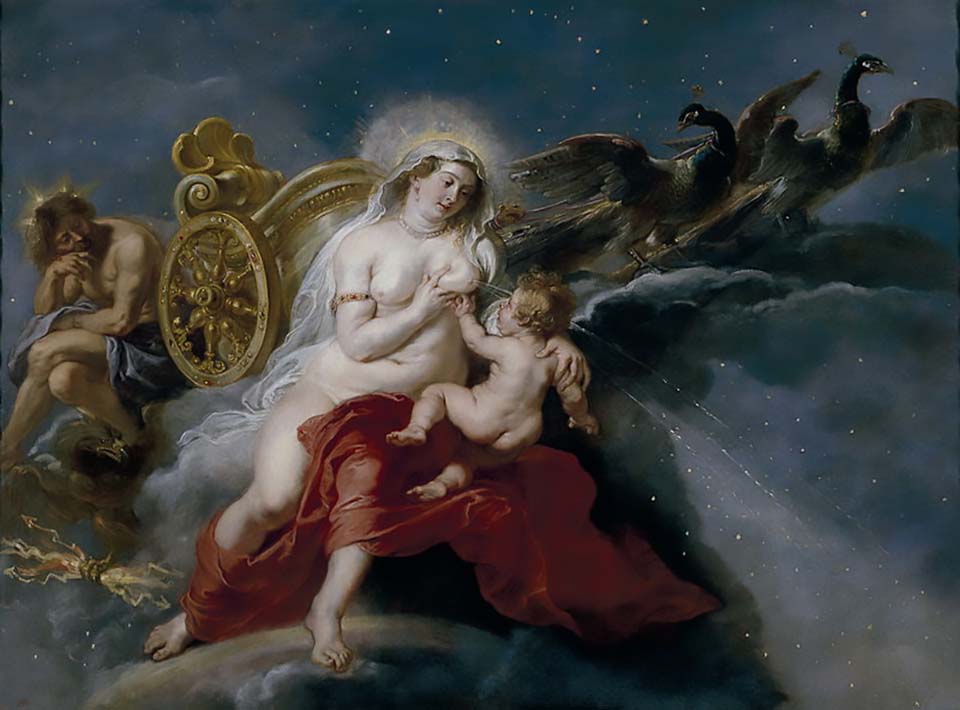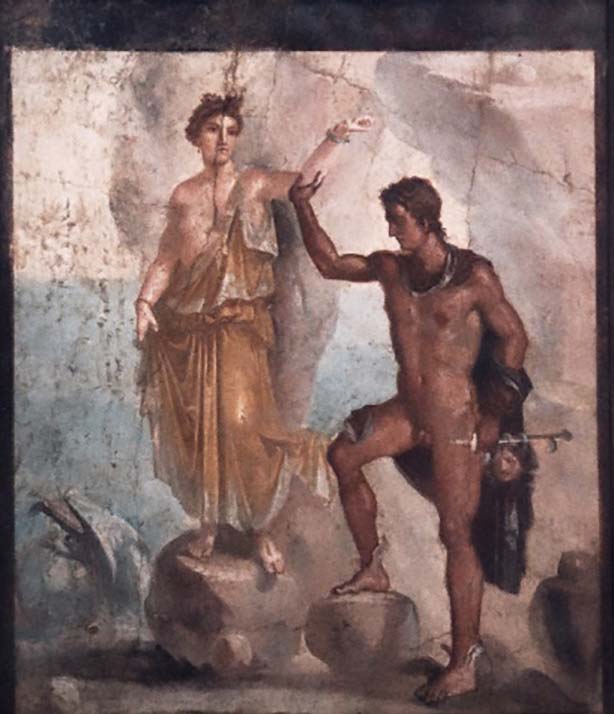Sthenelus
In Greek mythology, Sthenelus (Ancient Greek: Σθένελος Sthénelos, meaning: "strong one" or "forcer", derived from sthenos "strength, might, force") was a name attributed to several different individuals:
Sthenelus, father of Cycnus and King of Liguria.
Sthenelus or Sthenelās, king of Argos and son of Crotopus, son of Agenor, son of Triopas. He was the father of Gelanor.
Sthenelus, son of Aegyptus and Tyria, who married (and was killed by) Sthenele, daughter of Danaus and Memphis.
Sthenelus, son of Perseus and Andromeda.
Sthenelus, son of Actor (or of Androgeos) and a companion of Heracles, whom he accompanied to the land of the Amazons to take Hippolyte's girdle. Ammianus Marcellinus wrote that Sthenelus was killed during the war with the Amazons.
Sthenelus, son of Capaneus and Evadne.
Sthenelus (son of Capaneus)
In Greek mythology, Sthenelus was one of the Achaean Leaders. He was also counted as one of the Epigoni and a suitor of Helen.
In Greek mythology, the Epigoni (Ancient Greek: Ἐπίγονοι, meaning "offspring") are the sons of the Argive heroes who had fought and been killed in the first Theban war, the subject of the Thebaid, in which Polynices and six allies (the Seven Against Thebes) attacked Thebes because Polynices' brother, Eteocles, refused to give up the throne as promised.
The second Theban war, also called the war of the Epigoni, occurred ten years later, when the Epigoni, wishing to avenge the death of their fathers, attacked Thebes (the Epigoni did win this war).
According to the mythographer Apollodorus, they were:
Aegialeus, son of Adrastus
Alcmaeon, son of Amphiaraus
Amphilochus, son of Amphiaraus
Diomedes, son of Tydeus
Euryalus, son of Mecisteus
Promachus, son of Parthenopaeus
Sthenelus son of Capaneus
Thersander son of Polynices
To this list, the geographer Pausanias also adds:
Polydorus son of Hippomedon
Sthenelus was the son of Capaneus and Evadne. He was the father of Cylarabes and Cometes, lover of Aegialia.
What is more, Sthenelus fought alongside Diomedes and the other Argives in the Trojan War and brought 25 ships to Troy. He was one of the men who hid in the Trojan horse.
In the Iliad, Sthenelus boasts that he captured the city of Thebes, while his father, fighting alongside the Seven Against Thebes, was slain by a Zeus thrown thunderbolt while attempting the same thing. He ruled Iphis' half of Argos, along with Diomedes, after both Adrastus and Aegialeus had died.
Sthenelus of Mycenae
In Greek mythology, Sthenelus was a king of Mycenae.
Sthenelus was the son of Perseus and Andromeda and thus brother of Perses, Alcaeus, Heleus, Mestor, Electryon, Cynurus, Gorgophone and Autochthoe. By Nicippe, sister of Atreus and Thyestes, Sthenelus became the father of Eurystheus, Alcyone and Medusa (not to be confused with the Gorgon).
Sthenelus would be born in the city of Mycenae, city founded by Perseus, when Perseus had become king of Tiryns; Perseus having exchanged the kingdom of Argos for Tiryns, with Megapenthes.
The kingdom of Tiryns and Mycenae would pass from Perseus to Sthenelus’ brother Electryon. Electryon would have no male heirs, for his legitimate sons were killed fighting the sons of Pterelaus, King of the Taphians.
Electryon though did have a daughter, Alcmene, who was courted by Amphitryon, and so potentially Amphitryon would become heir of Electryon. Amphitryon would gain favour with Electryon for he retrieved the king’s stolen cattle, but disaster would befall Amphitryon, for when he threw a club to keep the cattle in check, it rebounded off the cow, hitting Electryon on the head, killing him.
Sthenelus seized the moment, by proclaiming himself king of Tiryns and Mycenae, and banishing Amphitryon and Alcmene for the crime of killing the king; thus, Sthenelus managed to rid himself of a rival to the throne.
Sthenelus would marry Nicippe, daughter of Pelops and Hippodamia; and Sthenelus would become father to two daughters, Alcyone and Medusa, and a son Eurystheus.
The birth of Sthenelus’ son, Eurystheus, is a famous event in Greek mythology, for Zeus made the proclamation that the descendent of Perseus due to be born on the given day, would become a powerful king of Mycenae.
Zeus was referring to the soon to be born son of Alcmene, Heracles, but Hera intervened, delaying the birth of Aclmene’s son, whilst inducing the birth of Sthenelus’ son, for both were Perseids, though, Eurystheus was also a Pelopide, a descendant of Pelops.
Sthenelus would be succeeded as king of Mycenae and Tiryns by his son Eurystheus. There is some suggestion that Sthenelus was killed by Hyllus, a son of Heracles, potentially during the efforts of the Heraclids to retake the kingdoms of the Peloponnese that they viewed as their birthright (for more watch our video: "The Legendary Kings of Sparta").

Sources
Ovid, Metamorphoses 2.367 ff
Pausanias, Graeciae Descriptio 2.16.1
Pseudo-Apollodorus, Bibliotheca 2.1.5
Pseudo-Apollodorus, Bibliotheca 2.4.5
Apollonius Rhodius, Argonautica 2.911 ff. with scholia
Pseudo-Apollodorus, Bibliotheca 2.5.9
Ammianus Marcellinus, History, 22.8.22
Pseudo-Apollodorus, Bibliotheca 3.7.2 & 3.10.8
Pseudo-Apollodorus, Bibliotheca 3.7.2
Hyginus, Fabulae 71
Pseudo-Apollodorus, Bibliotheca 3.10.8
Hyginus, Fabulae 81
Hyginus, Fabulae 71, 175 & 257
Pseudo-Apollodorus, Bibliotheca 3.7.2 & 3.10.8
Hyginus, Fabulae 97
Pseudo-Apollodorus, Bibliotheca Epitome of Book 4.6.9
Hyginus, Fabulae 108
Homer, Iliad 4.403-410













